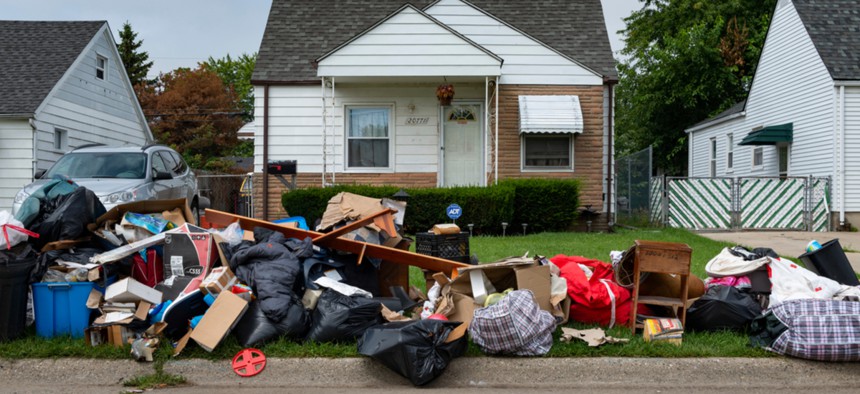The Need to Keep Renters Housed Is Getting More Urgent, Advocates Say

Experts warn that a wave of evictions will have devastating consequences. Shutterstock
As evictions rise, experts are raising concerns about homelessness, the further spread of the coronavirus, Census turnout, and the upcoming election.
Americans owe more than $21.5 billion in overdue rent, according to one recent analysis that underlined the urgency of the housing crisis facing American renters as the coronavirus pandemic drags on. With eviction moratoriums ending in many cities and states, experts are warning of an impending wave of families being forced out of their homes with devastating collateral consequences if immediate action is not taken to keep people housed.
Certain cities have begun to arise as “eviction hotspots” in the past few weeks, according to data collected by Princeton University’s Eviction Lab. Houston has become a hotspot for filings following the termination of the statewide eviction moratorium in May, and experts warn that hundreds of thousands of renters in the city may soon face eviction. Like many localities, the city funded rental assistance soon after the eviction moratorium ended, but found that the $15 million officials set aside was claimed in just 90 minutes.
In Milwaukee, Wisconsin, evictions in June rose above the city’s historical average, alarming tenants and local housing advocates.
“We’re seeing eviction numbers on a scale we’ve never seen before in Milwaukee,” said Alieza Durana, with the Eviction Lab. “But, to be clear, historical averages across the country were high to begin with. [In 2016], there were 3.7 million eviction filings, which is one every seven minutes. That’s the baseline, and it’s already too many families.”
With millions of Americans still unemployed and state and local eviction moratoriums that are already or soon to be expired, the number of renters who could face eviction this year could easily surpass that baseline in the “absence of immediate and generous local, state, or federal policies,” Durana said.
A federal ban prohibiting the eviction of people using housing vouchers or living in homes financed by federally backed mortgages ended last month, although landlords aren’t allowed to file for evictions on covered properties until August 24. (Housing advocates say some evictions have been happening anyway, raising questions about enforcement). Advocates for both landlords and tenants have urged Congress to provide financial assistance for housing in the next coronavirus relief package. But Democrats and Republicans are still very far apart on what to include in that bill and it remains unclear whether Congress could reinstate its moratorium.
Communities that are populated by low-income families, immigrants, and people of color are likely to be hardest hit by evictions, potentially pushing people into housing conditions that are unsafe during the coronavirus pandemic. Homeless shelters, for example, are not set up for social distancing.
Experts are also concerned that as people move in with friends and family, or turn to shelters, there could be a significant downturn in the number of people who are able to participate in two key 2020 events: the presidential election and the Census. Both require a steady home address—particularly for this year’s election, which will likely see a much higher rate of mail-in voting than in previous years.
Census Counts, an advocacy organization for Census turnout, has also warned that low-income renters “could be undercounted if their address is not updated when evicted” and that the Census Bureau relies on “assistance from local officials and community advocates in identifying temporary transitory locations, such as motels that now house families displaced by economic distress.”
At least two cities, Boston and Philadelphia, have extended their eviction moratoriums to the end of 2020 or beyond. The Philadelphia ban, which will now last until March of 2021, only applies to evictions that are for nonpayment of rent. The city’s housing authority said in a release that they want to assure the city’s “80,000 low-income residents, who have been disproportionately impacted by the virus, that their housing will not be a cause for concern during this period of health and economic uncertainty.”
One measure being considered in Congress, , introduced by Rep. Ayanna Pressley, a Democrat from Massachusetts, would direct $10 billion to states and localities for homelessness prevention and providing legal representation to those facing eviction, as tenants are much less likely to have an attorney than landlords. Pressley and other lawmakers say that housing help is a form of racial justice, as Black renters are disproportionately affected by evictions in many states.
In announcing the legislation, Pressley said that the “bold, urgent action” is needed in the face of “an unprecedented financial cliff” that could cause “an impending eviction tsunami.”
As negotiations for that legislation and other measures drag on, President Trump has suggested that he may take executive action on an eviction moratorium sometime soon. “I could do that if I want, and I want to do that. I don’t want people to be evicted,” Trump said during a Monday news conference.
Whatever the federal response may be, Durana said that lawmakers should take this time to start reimagining the idea of “housing as a business” and instead think of it as a system that serves a basic human need. “We need to rethink the way housing and rental properties are different from other types of investments,” she said, “because people have been ignoring the human toll of eviction for a long time.”
Emma Coleman is the assistant editor for Route Fifty.
NEXT STORY: Seven States Band Together to Purchase Rapid-Result Covid Tests






